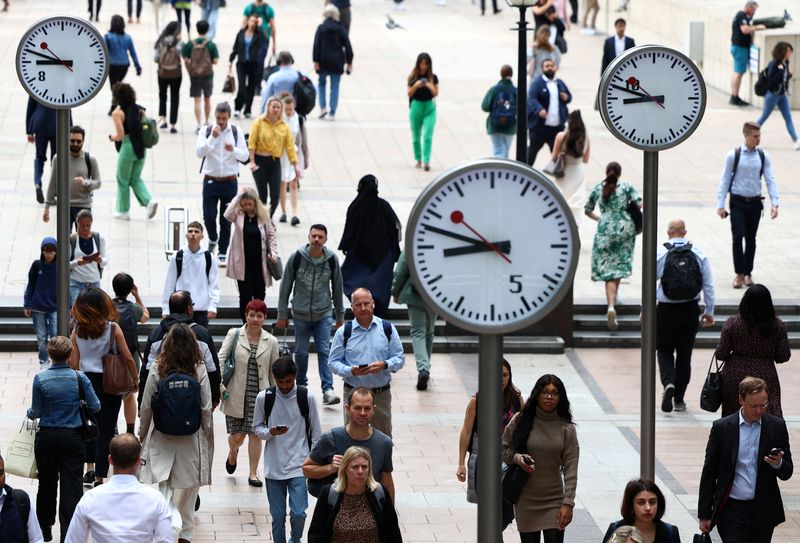By David Milliken
LONDON (Reuters) - Britain's labour market has been cooling in recent months, with rising unemployment, less hiring and fewer job vacancies - but wage growth has shown much less sign of following suit.
This is a problem for the Bank of England, which has said that slower wage growth is needed for it to be confident inflation will return to its 2% target from a current level of 6.8%, the highest of any major economy.
New official data on Tuesday showed the joint-fastest growth in regular pay on record, twinned with the biggest slump in employment since 2020 and a rise in the jobless rate to its highest since 2021.
Financial markets widely expect the BoE to raise interest rates next week to 5.5% from 5.25%, but are split over whether that will mark the end of a tightening cycle which began in December 2021.
Four graphics below illustrate where Britain's labour market is at.
UNEMPLOYMENT
Britain's unemployment rate rose to 4.3% in the three months to July, up from 4.2% in the second quarter and 3.5% in August 2022 - its lowest in nearly 50 years.
Unemployment is already above the level which the Bank of England forecast last month. Those forecasts saw inflation rising slowly over the next three years to 5%.
Britain's jobless rate now exceeds that in the United States, where unemployment has also started to rise. British joblessness tracked the U.S. rate closely over the past decade, except during the COVID-19 pandemic when furlough payments to employers kept the jobless rate much lower in Britain.
Euro zone unemployment is above Britain's, although it continues to decline.
EMPLOYMENT
Britain's labour market lost more than 200,000 jobs in the three months to July, the sharpest drop in employment since the three months to October 2020 when many businesses were slashing staff due to COVID-19 lockdown restrictions.
Hannah Slaughter, senior economist at the Resolution Foundation think tank, said this was the biggest drop in employment ever seen in Britain outside of a recession.
"This is the clearest sign yet that the Bank of England's rate rising cycle is starting to cool the jobs market," she said.
Until recently, employment was growing strongly with a quarter of a million jobs created in the three months to April, returning employment to its pre-pandemic levels.
Most of the latest fall reflects a drop in the number of self-employed workers, while employment held stable.
Business surveys from the Recruitment and Employment Confederation (REC) and the S&P Purchasing Managers' Index (PMI) had pointed to a steady cooling in hiring over the past year, and now show flat or negative demand.
VACANCIES
Job vacancies hit a record 1.3 million in early 2022, and have been declining steadily since, dropping below 1 million for the first time in two years during the three months to the end of August.
However, the number of vacancies is still more than 20% higher than before the pandemic, and there remain fewer unemployed people per vacancy than any time in 2020 or earlier.
Most businesses report difficulties hiring, accounting for some of the slowdown in employment in recent surveys.
"While there is a rebalancing, it's a gradual change, meaning employers still often need to offer salaries at elevated rates to attract staff and fill open roles that compensate for the cost-of-living crisis," said Jack Kennedy, senior economist at recruitment website Indeed.
WAGES
At odds with the trend in unemployment, hiring and vacancies is wage growth, which rose to an annual rate of 8.5% in the three months to July. This was a bigger increase than economists had forecast in a Reuters poll, and the largest since modern records began in 2001, excluding a spike in June 2021 due to furlough-related distortions.
The rise partly reflected backdated pay settlements for public-sector workers, and the BoE focuses more on underlying measures. However, the news for the central bank was little better here.
Pay growth excluding bonuses held at a record 7.8%, while pay growth excluding bonuses in the private sector alone fell only slightly, to 8.1% from 8.2%.
The BoE will be hoping that the businesses it surveys are accurate in expecting pay growth to slow to 5% in a year's time - although this is still higher than 3-4% seen before the pandemic when inflation was near target.
Consumer price inflation peaked in October 2022 at 11.1%, but wage growth has yet to follow suit. July was the first time since the first quarter of 2022 - when Russia invaded Ukraine - that pay rose faster than CPI inflation.
REC surveys have pointed to gently slowing pay growth for new hires and temporary workers for more than a year, without a similar move in the official data which covers all employees.

Advertised salaries for new workers were also 7.4% higher in August than a year earlier, up slightly from 7.1% in July, according to figures from recruitment website Indeed.
(This story has been refiled to fix a typo in the headline)
